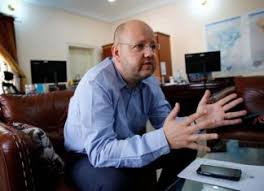By Asma’u Ahmad
The United Nations had on Monday declared that $9.9 million was urgently required to respond to the current cholera outbreak in Borno state and prevent further outbreaks in high-risk areas.
Deputy Humanitarian Coordinator for Nigeria, Peter Lundberg, stated this issued in Maiduguri by the Head of Communications, UN Office for the Coordination of Humanitarian Affairs in Nigeria, Samantha Newport.Mr Lundberg said that a Cholera Response and Prevention Plan (CRPP) had been developed to address the situation.
He said that the plan was to address the immediate needs of 3.7 million people that could be affected by the outbreak. He said that despite extensive efforts to improve sanitation conditions in camps and raise awareness on the importance of best hygiene practices, the first cholera cases were identified in Borno on August 16.
“To date, the outbreak has claimed at least 44 lives, out of close to 2,300 confirmed and/or suspected cases. Humanitarian partners have been working around the clock in support of the Borno State Ministry of Health to contain the outbreak and implement preventive measures in the most at-risk locations.
“Four specialised treatment centres (for the most severe cases) and seven oral rehydration points (for the milder cases) have been set up in all three affected areas,” he said.
Mr Lundberg said that teams of community mobilisers and chlorine sprayers had been going from shelter to shelter; informing families of the risk of infection and how to get treatment should symptoms manifest.
He said: “The clock is ticking. The camps for displaced persons are congested; there is not enough water, sanitation facilities are poor, and the health care system is weak. We must tackle this urgently to avoid preventable suffering and loss of life.
He said that the CRPP laid out the strategy to address the outbreak from all angles over the next few months, including treating identified cases, monitoring and tracking of new potential cases.
Lundberg said that the plan also involved improving sanitation conditions, ensuring affected people have access to clean water, informing communities and carrying out vaccination campaigns in addition to other life-saving interventions.
“We need a holistic and comprehensive response to this outbreak and a clear prevention strategy. The implications of not responding in a timely manner could be absolutely devastating for millions of conflict-affected women, children and men who are already living in very dire conditions,” he added.
According to him the humanitarian crisis in Nigeria’s north-east is one of the most severe in the world today, with 8.5 million people in need of life-saving aid in Borno, Adamawa and Yobe states. Lundberg said that 6.9 million out of the 8.5 people were targeted for humanitarian assistance.





